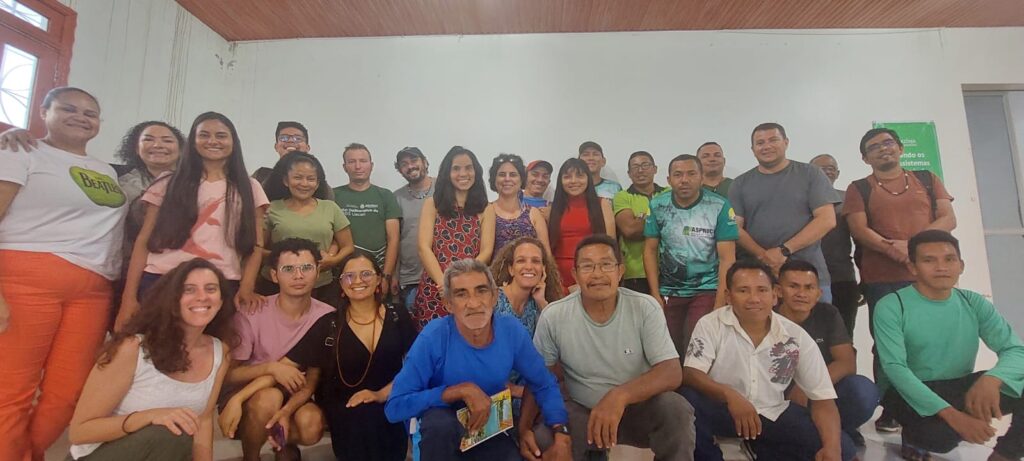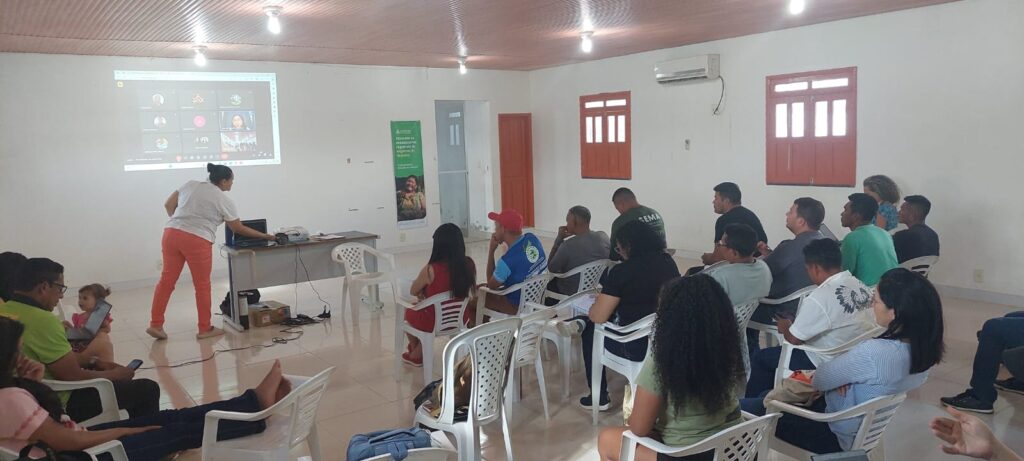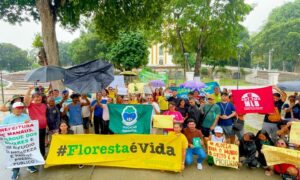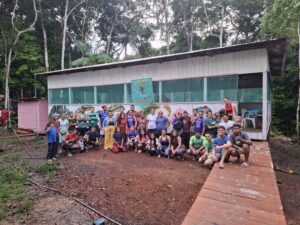The event is one of the main instances of collective deliberation of the Mid-Juruá
By Clara Machado and Milena Azevedo

The 33rd Meeting of the Forum of the Mid-Juruá Territory (FTMJ, in the acronym in Portuguese) took place on July 18 and 19, at the headquarters of the Association of Rural Producers of Carauari (ASPROC) in Carauari, Amazonas. The event brought together representatives of all the local organizations that make up the Forum, as well as institutional partners working in the region.
The Forum meeting is one of the main instances of deliberation of the territory since it is a moment of presentation of results, proposals, and governance referrals for the territory. The grassroots associations presented their projects in progress, which were debated and the main demands were raised by the collective and the necessary referrals were determined.
Throughout the two days, several agendas were discussed, with emphasis on the theme of rural education and discussions of strategies to ensure the use of land and its natural resources, to increase the perspective of areas used sustainably.

Through fisheries agreements, communities and institutions that are not within the limits of conservation units can claim their land use rights for the provision of production and income, guaranteeing the subsistence of rural families. In line with this objective, the TMJ Forum seeks strategies to ensure that the territory remains preserved and under the control of the communities, such as, for example, through an urgent request for approval of the fishing agreement of the Municipality of Itamarati and updating of the fishing agreement of the Municipality of Carauari (both in the state of Amazonas). This model of fisheries agreement is one of the tools that strengthen the use of territory and resources in a sustainable way through the management of natural resources.
The second highlight of this 33rd meeting of the Forum was rural education for riverine and indigenous communities. The higher education training course of Field Pedagogy of the State University of Amazonas has already completed the fifth term of its first class in the territory. The course was a deliberate demand by the Forum itself, and as it is the first course in this format in the Amazon, in a remote rural area, the difficulties are enormous, especially from a logistical point of view. The Forum has always debated and sought to achieve improvements for the best possible meeting of the needs of the students and, in this meeting, the central point of the discussions were the improvements in infrastructure. In this formation, the teaching to meet the riverside communities has been highlighted so that, in the near future, the teaching-learning process in the rural schools of the Mid-Juruá contemplates the reality of the students and the social organization of the territory.
The Municipal Department of Education of Carauari also participated in the discussions about rural education, advancing in the elaboration of a training proposal that includes, in the school grid, subjects focused on the local reality and the history of the region’s grassroots organizations. This is an old demand of the Forum, so that children and young people have the right to access the historical information of the territory within the school curriculum.
Also in this sense, the progress of the project to edit the book “Extractive Reserve: More Life on This Land ” was presented, which brings together two books, one from 2007 of the same name, written by priests João Derickx and another from 1992, “In the heart of the Amazon: Juruá, the river that cries”, by priests João Derickx and José Antonio Trasferetti. Both report the struggles and injustices in the Juruá River region and the positive changes that occurred in the territory with the creation of conservation units and conquests of rights for the forest peoples. The new edition is the result of a collective fundraising campaign, which gathered resources for the printing of books that will be distributed free of charge to rural schools, communities, associations, churches, government agencies, and NGOs in the Mid-Juruá Territory.
The event was attended by all the grassroots associations that make up the Forum: Association of Rural Producers of Carauari (ASPROC); Mixed Cooperative of Sustainable Development and Solidarity Economy of the Mid-Juruá (CODAEMJ); Association of Agroextractive Residents of the Sustainable Development Reserve of Uacari (AMARU); Association of the Deni People of the Xeruã River (ASPODEX); Association of Agroextractive Residents of the Lower Mid-Juruá (AMAB); Environmental Association Extractivists, Fishermen, and Rural Producers of Itamarati (AAEPPRI); Association of Agroextractive Producers of the Nova Esperança Community (AANE); Association of Agroextractive Women of the Mid-Juruá (ASMAMJ); Association of Extractivist Residents of the São Raimundo Community (AMECSARA).
Among the partner institutions were the Institute of Education of Brazil (IEB), Natura Cosméticos, Secretaries of Environment of Carauari and Itamarati, ICMBio, National Council of Extractive Peoples (CNS), the Chico Mendes Memorial (MCM), Sitawi, Sustainable Amazon Foundation (FAS), Instituto Juruá, and the State University of Amazonas.






